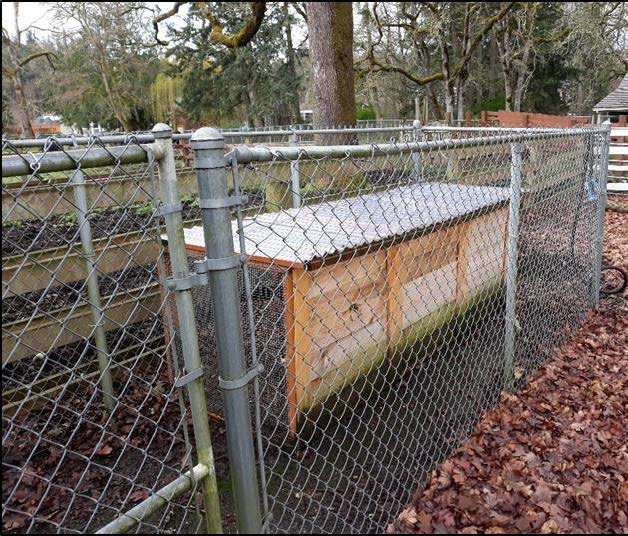
Like many home gardeners, we maintain a compost bin (a lovely 3-bin system built by my husband). I don’t need very much compost as the only organic matter I add to our landscapes is an arborist wood chip mulch. We do have a couple of raised beds for veggies and I do need organic matter for potted plants, so our compost goes there.

A few weeks ago I was preparing our raised beds for spring planting. (Actually, I should have done this in the fall but better late than never.) In any case, my raised bed preparation consists of a few very easy steps:

The stages of raised bed renewal 
Bare soil and soaker hoses (top), compost layer (middle) and chips (bottom) 
Compost layer (left) will be covered with chips (right)
- Clear out any weeds or veggie residue.
- Pull all wood chips to one side, leaving soaker hoses exposed.
- Lay down a thin layer of compost
- Replace wood chips and add more as needed to raise mulch level to at least 4”.
This is a great way to preserve and enhance the soil environment, while inhibiting weed growth. In the spring, I only have to pull the chips back and plant seeds or starts.

But back to the compost. We only add kitchen scraps and yard debris to our bins. Nearly everything is unrecognizable after it’s been composting, save a few eggshell pieces. So imagine my surprise and unhappiness when I found partially decomposed and even intact tea bags in my finished compost.

Now, I drink a lot of tea. I go through 4-8 teabags a day. Most of those teabags are of the simple paper variety, but I do get fancy pyramidal tea bags on occasion. Many of the sellers of these teabags claim their products are biodegradable, and some are made of silk or some other degradable fiber. But most are made of nylon. And they are full of microplastics.
This problem was reported years ago by The Guardian, which I managed to miss until recently. This article is well worth reading for those of you who drink tea and compost the teabags. Here are a few salient quotes:
“A single silky plastic tea bag at brewing temperature (95C) releases… microplastics,…nanoplastics… and polyethylene terephthalate (PET) into a single cup of tea.”
“To put it unscientifically, the amount of plastic found in these tea bags is more than we ingest from just about anything else.”

I’ve written before about the dangers of unwanted chemicals in corrugated cardboard and advised against its use on soil or in compost. Now we need to add nylon teabags to the list. The research reported in The Guardian is alarming enough that I will no longer use pyramidal teabags in brewing my tea. I won’t even compost the tea leaves in these bags, as they are contaminated by the brewing process.
Have you found uncomposted items in your finished compost that surprised you? Make a comment below!
After reading your article against composting cardboard – I am now a convert against its use in the garden – I went down the rabbit hole of your articles and into composting.
Your discovery with the pyramid tea bags struck a harsh cord with me.
We had septic issues and had to lift the lid. Floating at the top were what looked like teas bags or snuff pouches. Imagine my horror when it clicked that my husband and FIL were closely examining my tampon covers. A tampon which touts being environmental due to its applicator-less construction.
How long have women been poisoning themselves and the environment? No wonder there’s such a high rate of inflammatory disease in women…. My brain hurts!
Thank you for your research and clear articles. And everyone asks why OSU is my favorite smh
Thank you Sylvia! You bring up additional serious safety concerns with what we put into our soils and water because we’re told they are environmentally friendly. I appreciate your sharing your experience and your cautions to readers.